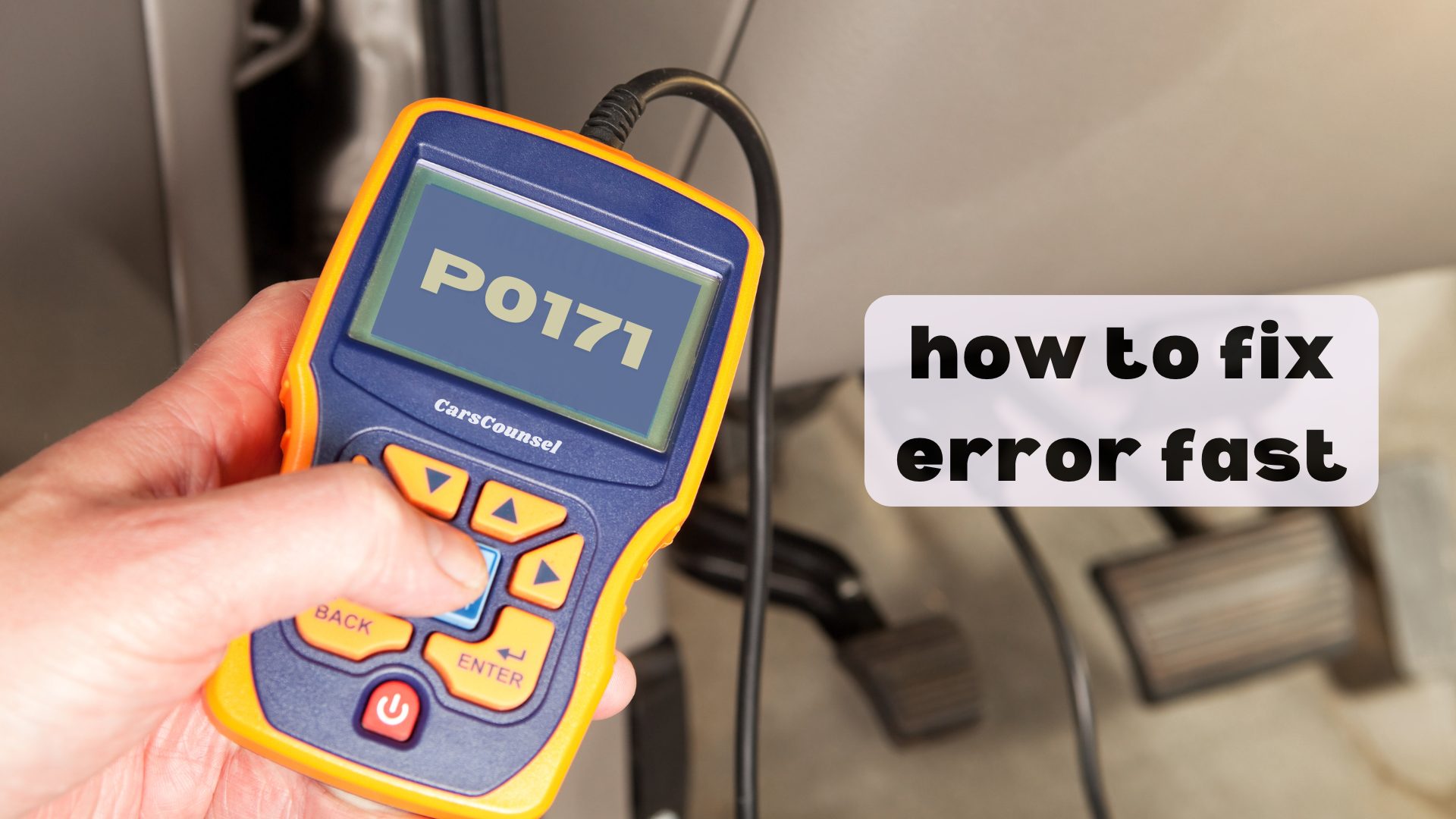Are you suspecting that your engine’s fuel trim system is running too lean, triggering the P0171 code? You’re not alone – many vehicle owners have encountered this issue, which can lead to decreased performance, rough idling, and poor fuel efficiency. But what’s behind this fault code, and how can you fix it? Is it a faulty oxygen sensor, a clogged fuel filter, or something more complex?
The good news is that identifying and addressing the root cause can prevent further damage and get your engine running smoothly again – but you’ll need to take a closer look to determine the source of the problem.

Quick Navigation
Key Takeaways
- The P0171 code indicates a lean fuel mixture in the engine’s bank 1, which can cause reduced power, rough idling, and hesitation during acceleration.
- Common causes of the P0171 code include vacuum leaks, faulty oxygen sensors, clogged fuel filters, and malfunctioning mass airflow sensors or fuel injectors.
- Symptoms of a lean fuel system include decreased fuel efficiency, rough idling, hesitation, and decreased engine performance, which can worsen if left unaddressed.
- To diagnose the issue, inspect the fuel system for leaks, blockages, or malfunctions, and check the oxygen sensor, mass airflow sensor, and fuel injectors for proper operation.
- Repairing the issue requires identifying and addressing the root cause, which can involve replacing faulty components, cleaning or replacing fuel filters, and performing routine maintenance checks.
What Is Code P0171?
When your vehicle’s onboard computer triggers the P0171 code, it’s indicating that the fuel system is running lean on bank 1 of the engine, which means the air-fuel mixture is imbalanced, with more air than fuel.
This imbalance can significantly impact engine performance, leading to issues like reduced power, rough idling, and hesitation during acceleration.
The code is set when the engine computer detects a lean mixture in the exhaust gases, but it doesn’t specify the exact cause of the problem.
As a result, you’ll need to investigate further to identify the root cause of the issue.
Understanding the P0171 code is vital to addressing the underlying problem and restoring peak engine performance.
Common Causes of P0171 Code
Digging into the root cause of the P0171 code, you’ll likely find that one of several common culprits is to blame.
Vacuum leaks in the air intake system, for instance, can allow excess air to enter the engine, leading to a lean fuel mixture.
A faulty oxygen sensor can also cause the engine computer to misread the air-fuel mixture, resulting in a lean condition.
Additionally, a clogged fuel filter or malfunctioning mass airflow sensor can restrict fuel flow, causing the engine to run lean.
Faulty fuel injectors can also contribute to the problem, preventing the proper amount of fuel from being delivered to the engine.
Air leaks, clogged fuel filters, and malfunctioning sensors are all common causes of the P0171 code.
Symptoms of a Lean Fuel System
If your engine is running with a lean fuel mixture, you’ll likely notice some telltale signs.
One of the most noticeable symptoms is a decrease in fuel efficiency, as the engine struggles to burn the limited fuel properly. You may also experience rough idling, hesitation during acceleration, and a decrease in overall engine performance.
Additionally, you may notice engine misfires, which can be accompanied by a rough or sputtering sound. As the lean fuel mixture persists, you may even notice a decrease in power and responsiveness when driving.
These symptoms can be frustrating and affect your daily commute, making it essential to address the issue promptly.
Diagnosing the P0171 Code Issue
Your vehicle’s onboard computer has triggered the P0171 code, indicating a lean fuel mixture on bank 1 of the engine.
Now, it’s time to diagnose the issue. Start by performing a thorough fuel system inspection to identify any leaks, blockages, or malfunctions.
Check the air intake system for vacuum leaks, and inspect the fuel filter, oxygen sensor, and mass airflow sensor for any signs of damage or wear.
A faulty fuel injector or malfunctioning engine computer can also cause a lean fuel mixture.
To optimize engine performance, you’ll need to identify and address the root cause of the problem.
Repairing a Faulty Fuel System
Several components in the fuel system can malfunction, leading to a lean fuel mixture and triggering the P0171 code.
To repair the faulty fuel system, you’ll need to identify and address the root cause of the problem. Start by performing system maintenance checks to rule out any blockages or leaks in the fuel lines, fuel filter, or air intake system.
Next, inspect the fuel injectors and consider fuel injector cleaning or replacement if necessary. Additionally, check the oxygen sensor and mass airflow sensor for proper operation.
Cost of Repairing P0171 Code
When diagnosing and repairing a P0171 code, it’s essential to weigh the cost of the repairs, as it can vary widely depending on the root cause of the issue.
You’ll need to ponder the cost of parts, labor, and diagnostic time to determine the total cost of repairs.
In some cases, a simple fix like replacing a faulty oxygen sensor or cleaning a clogged fuel filter may be relatively inexpensive, while a more extensive fuel system overhaul may be necessary, resulting in higher costs.
Using cost estimation methods, such as breaking down the repair into individual tasks and estimating the time and materials required for each, can help you get a more accurate estimate of the total cost.
Preventing Future Fuel System Issues
Now that you have a better understanding of the costs involved in repairing a P0171 code, it’s time to focus on preventing future fuel system issues.
Regular fuel system maintenance is key to avoiding costly repairs down the line. Performing routine checks and replacements of fuel filters, oxygen sensors, and spark plugs can help prevent fuel system problems.
Additionally, addressing any vacuum leaks or malfunctioning mass airflow sensors can also help prevent issues. By taking these preventative measures, you can reduce the risk of future fuel system problems and avoid the inconvenience and expense of repairs.
Stay on top of fuel system maintenance to keep your engine running smoothly and efficiently.
Importance of Timely Repairs
Ignoring the warning signs of a P0171 code can lead to more severe and costly problems down the line, making timely repairs crucial to maintaining your vehicle’s overall health.
If you neglect to address the issue, you’ll likely experience a decline in fuel efficiency and engine performance. Your engine will struggle to run smoothly, leading to decreased power and responsiveness.
Furthermore, ignoring the problem can cause further damage to your engine, resulting in more expensive repairs or even engine failure.
More OBD-II Codes
Frequently Asked Questions
Can a P0171 Code Cause Damage to My Engine?
If you’re experiencing a lean fuel mixture, you’re risking damage to your engine, as it can lead to overheating, detonation, and premature wear, ultimately affecting your fuel efficiency and engine performance, so it’s vital to address the issue promptly.
How Long Does It Take to Diagnose and Repair a P0171 Code?
You’ll typically spend around 1-2 hours diagnosing a fuel system issue, including analyzing scan tool data and performing a thorough fuel system analysis, before your mechanic can provide an accurate estimate for repairs.
Will a P0171 Code Affect My Vehicle’s Emissions Test?
As you rev up your engine, a lean fuel mixture simmers beneath the surface, threatening to leave a dark cloud on your emissions test results, potentially failing to meet stringent emissions standards, and compromising your vehicle’s emissions control systems.
Can I Drive My Vehicle With a P0171 Code?
You can drive your vehicle with a P0171 code, but be aware that decreased fuel efficiency and altered driving habits may be necessary to avoid exacerbating the issue, as the lean fuel mixture can cause engine damage if neglected.
Will a Tune-Up Fix a P0171 Code?
You’re wondering if a tune-up will fix the issue; unfortunately, a standard tune-up, which typically includes replacing spark plugs, won’t directly address the root cause of the lean fuel mixture, such as faulty fuel injectors, which require more extensive diagnosis and repair.
Conclusion
As you address the P0171 code, bear in mind that a lean fuel system is like a fire that’s starved of oxygen – it’ll sputter and struggle to perform. Don’t let your engine become a flickering flame; timely repairs are vital to maintaining its health. In fact, a study found that fixing fuel system issues promptly can improve fuel efficiency by up to 20%. So, don’t ignore the warning signs – tackle the P0171 code head-on to get your engine roaring back to life.


On 2016 Mini Cooper the engine manifold light(orange) comes on for a month or two then goes off for a month or two. A proscan shows error PO171-system too lean bank 1.
Why is the error intermittent?
Same issue. I originally thought something was loose Mechanics don’t understand.